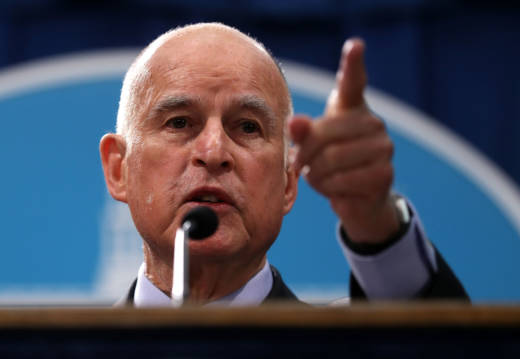It would bring the rainy day fund to 100 percent of its constitutional target.
The proposed budget for K-14 education would grow to $78.3 billion, its highest level ever, and up $31 billion over the past seven years. Per-pupil spending would grow by $4,600 for 2018-19, and the policy to send more money to school districts with high numbers of English learners and low-income kids would be fully implemented this year.
The governor is also proposing $4.6 billion in additional transportation funding from a massive transportation package passed last year. It includes $2.8 billion to repair roads, highways and bridges.
Asked about how his spending priorities over the past seven years might affect his legacy, Brown deflected.
"Governors don’t have legacies. That's my number one proposition," Brown said. "Can you tell me the legacy of Goodwin Knight or George Deukmejian?" he asked, notably leaving out his father, Pat Brown, whose legacy is widely believed to include building up the state's universities and infrastructure.
Brown's budget proposal comes amid federal budget uncertainty. Buoyed by their victory on federal tax reform, House Speaker Paul Ryan says he'll next try to cut federal spending on welfare and Medicare, moves that could affect California's budget.
But legislative Democrats still have a lot they'd like to accomplish in the state. Assembly Budget Chair Phil Ting (D-San Francisco) has laid out numerous proposals for the projected budget surplus. They include increasing the earned income tax credit, expanding Medi-Cal to cover all the uninsured, making early education available to all 4-year-olds and putting more money into reserves.
“We cannot ignore the fact that not all Californians have benefited from our state’s renewed prosperity,” Ting said, while unveiling his budget priorities last month.
Senate Budget Chair Holly Mitchell (D- Los Angeles) says the governor's proposal makes some good investments in education and prison infrastructure. But she's not entirely satisfied.
"As it relates to poverty, the governor stated that unlike other states, California has a good system of support, but it is modest. Here, modesty is not good enough," Mitchell said. "I would like to see more increases in SSI COLAs, and investments in human services, particularly as it relates to deep poverty and CalWORKs. In addition, the need that working parents have for child care is immense and more funding is essential.”
Republicans applauded Brown's move to build up the state's reserves. But Assembly Budget Committee Vice Chair Jay Obernolte (R-Hesperia) said the state should also use the budget surplus to pay down long-term debt liabilities.
"We currently have over $200 billion in long-term liabilities. Paying that down now will reduce future state spending," he said.
Assembly Republican Leader Brian Dahle (R-Bieber) reinforced the GOP's philosophy that spending is far too high.
“It’s a strange world where politicians are celebrating that the government took too much money from taxpayers, but that’s exactly what is happening with this budget surplus," Dahle said in a statement. "My question is: When do California taxpayers get a break?"
